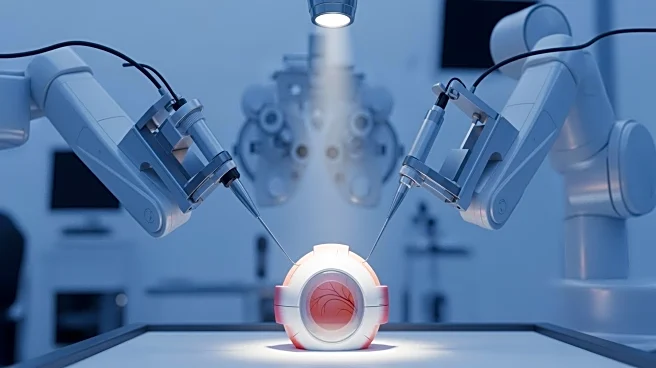What's Happening?
Researchers at the Technical University Munich (TUM) have developed a precision robot designed to administer injections with micrometer accuracy, specifically targeting ophthalmic applications. The robot,
which operates with a precision of 15 micrometers, is intended to enhance the safety and effectiveness of eye surgeries by minimizing complications such as inflammation. The development involves collaboration with a Japanese manufacturing company and utilizes optical coherence tomography (OCT) to detect involuntary eye movements during surgery. The robot's ability to follow these movements allows for precise drug administration, reducing the risk of manual errors. The next phase of testing will involve trials on the eyes of dead pigs, followed by live animal tests in early 2026, with human clinical trials anticipated in the following years.
Why It's Important?
The introduction of this precision robot in ophthalmic surgery represents a significant advancement in medical technology, potentially transforming the way eye surgeries are conducted. By reducing the risk of complications associated with manual injections, the robot could improve patient outcomes and streamline surgical procedures. This development is particularly relevant for conditions like macular degeneration, where precise drug delivery is crucial. The project, supported by the Federal Ministry of Research, Technology, and Space with a €1.91 million funding, underscores the growing role of AI and robotics in healthcare, aiming to enhance the competence and safety of medical staff in robotic applications.
What's Next?
The next steps for the precision robot include testing on the eyes of dead pigs, which share structural similarities with human eyes. These trials are crucial for assessing the robot's performance and safety before proceeding to live animal tests scheduled for early 2026. Human clinical trials are expected to follow in subsequent years, contingent on successful animal testing outcomes. The ongoing research project, GRATA, led by Prof. Ali Nasseri, aims to develop a modular, AI-supported platform for robot-assisted microsurgery, with contributions from various partners including fortiss, TU Chemnitz, and adesso SE.
Beyond the Headlines
The development of this precision robot highlights the ethical considerations in advancing medical technology, particularly in terms of patient safety and the potential reduction of human error in surgical procedures. It also raises questions about the integration of AI in healthcare and the need for regulatory frameworks to ensure the safe deployment of such technologies. Long-term, this innovation could lead to broader applications in other areas of microsurgery, setting a precedent for future advancements in robotic-assisted medical interventions.








